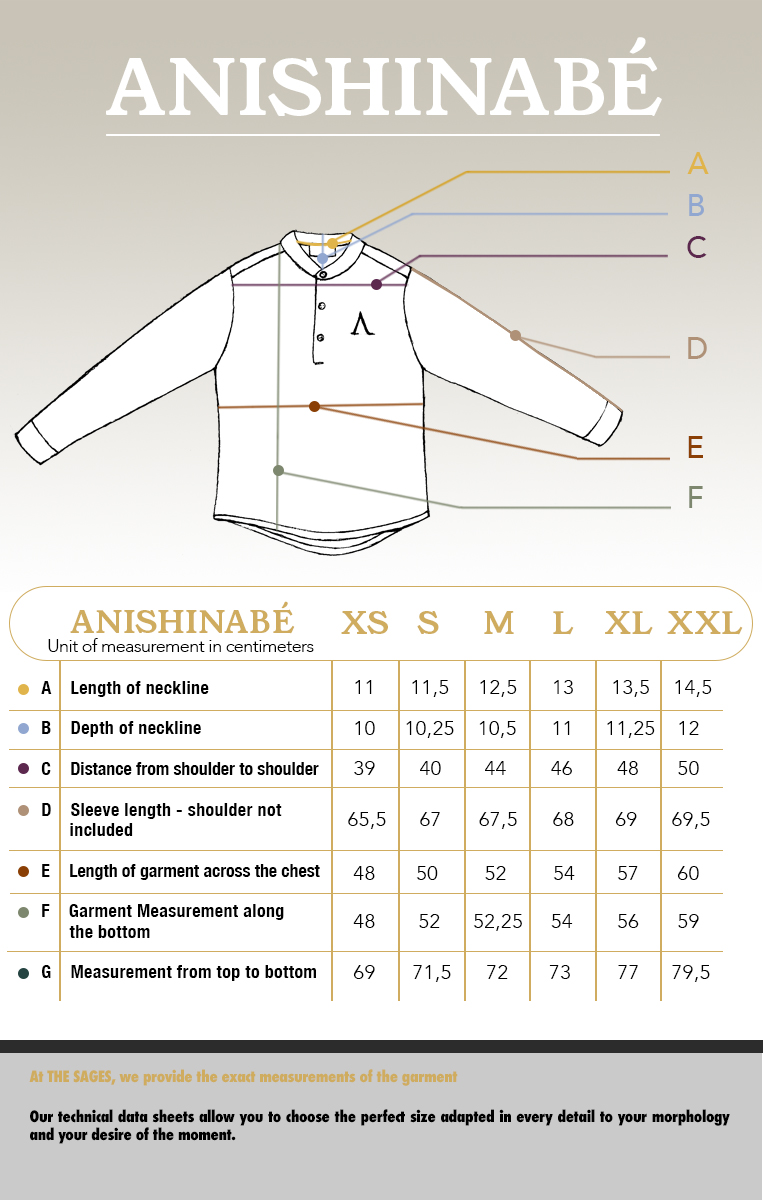ANISHINABÉ: THE SAGES’ T-SHIRT
Organic cotton and bamboo
100% of your purchase funds our mission

WHEN YOU BUY "ANISHINABE": THE SAGES T-SHIRT
MADE WITH PLANT MATERIALS
100% OF THE PROFITS FROM THE SALES
GOES TOWARDS FUNDING OUR SOCIAL MISSION:
FIGHT AGAINST GLOBAL WARMING
THANKS TO A SUSTAINABLY MANAGED CULTURE
DEVELOP THE SAGES MEDIA:
ALREADY OVER 1 MILLION VIEWS.
LET'S EMBODY THE CHANGE
WE WANT TO SEE IN THE WORLD
Our very first ANISHINABÉ T-shirt was made in a Canadian eco-village, where a small resilient community lives according to the natural cycle. The organic cotton and bamboo in this item of clothing comes from an artisanal mill in an urban district in Montreal. The T-shirt, which is a woody grey-green colour and is remarkably soft, symbolises the union between the city and nature.
70% bamboo 30% organic cotton
The labels featuring the brand and composition are recycled.* (made from recycled synthetic fibres (T-shirts, fibres, etc) and PET (recycled plastic bottles, etc).
Our hang tag is made from recycled paper and sewn with wild seeds. Discover our small guide to urban planting.
The fabric is made in Canada
ANISHINABÉ was designed in an eco-village in Quebec.
ANISHINABÉ is made in the Minho, a rural region in the north of Portugal.
The labels are sourced in Portugal.
The hang tag is made and sewn with seeds in Paris.
How do I take care of my clothes?
Wash inside out in cold water. You may want to make your own washing liquid or use soapnut soap.
When you have worn your clothes once or twice, do not systematically wash them unless they are stained; simply turn them inside out and hang them up where there is a draught. Spray the clothing with a very light mixture composed of 3 drops of essential oils and diluted in water, such as the sweet-scented ylang-ylang or peppermint. During the day, use a solid deodorant that can be carried in a small recycled box, and use it whenever necessary to counter the effect of the heat. During your lunch, snack, or dinner, the good old napkin tied around the neck is back in fashion. When you are back home, washing your most natural items of clothing by hand to avoid altering the way they hang is a really relaxing experience; play some music you like to listen to, and light a candle and a stick of local sage. Get involved in taking care of things you really love and care about. If there are any stains it all depends on the materials, but for linen you can use a sponge soaked in soapy water on the stain. Then rub it with a cloth soaked in bicarbonate and water. If any of the marks are still there use a cloth soaked in vinegar. If the stain is stubborn and you decide to do a machine wash, never go over 30° and do not dry it in a tumble dryerhang up the clothing instead. For your clothing made from recycled synthetic fibres, use a ‘no particles’ washing filter to optimise your ecological footprint. Other questions … why not take your clothing to a quality dry cleaners and get advice or tailor-made assistance? Since every stain is different (the extent to which it is embedded in the fibres, the type of stain, the age of the stain, etc.), quality advice from a knowledgeable professional is sometimes better than playing sorcerer’s apprentice.
Our parcels are recycled and/or compostable.
The plastic wrapping paper in which the clothing is packed is made from recycled paper.
The printed silk paper and sticker are FSC certified (acid-free paper and soy-based ink).


Validate your login